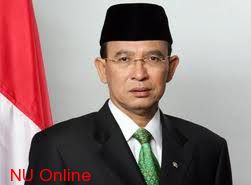Shia followers are free to practice their faith: Minister
NU Online · Rabu, 18 September 2013 | 02:44 WIB
Jakarta, NU Online
The government has made another promise to the displaced Shia followers from Sampang in Madura, East Java — that they will be able to safely practice their faith once they return to their home villages.<>
Religious Affairs Minister Suryadharma Ali, who has been under fire for allegedly supporting the forced conversion of Shiites to Sunni Islam, guaranteed that the government would protect the Shiites’ rights to perform religious activities according to their faith.
Suryadharma, however, said they would still have to undergo the so-called “enlightenment” program carried out by a government-sanctioned reconciliation team.
“This enlightenment process is led by a former rector of the Malang State Islamic University in East Java, Imam Suprayogo,” he was quoted by The Jakarta Post as saying.
“It is neither a forced conversion nor a requirement for [the Shia followers] to sign such a pact or accord or whatever you call it,” the minister explained at the State Palace on Monday.
He was referring to a claim made by a lawyer of the displaced Shia, that they were asked to renounce their faith if they wanted to return home. The lawyer, Hertasning Ichlas, said 34 Shia community members had returned to their homes by Aug. 7 as they had finally agreed to sign a pledge of nine points stating their willingness to return to “the true teaching of Islam”.
Suryadharma, who chairs the Islam-based United Development Party (PPP), insisted there was no forced conversion and that the Shia were only told “to promise to respect local values and norms”.
“It’s not just about religion or faith. The conflict was more of a social issue. Being a good part of a neighborhood must involve an understanding to respect norms, values and cultures adopted by its people. If such a value system is violated, conflicts become prevalent. It’s as simple as that,” he said.
The minister claimed seven Shia families had returned home via the enlightenment process.
The 235 displaced Shiites from 69 families were evicted from their villages in Sampang after angry Sunni local residents set their homes ablaze in August last year. Following the deadly conflict, the Shiites were forced to live at a temporary shelter at Sampang sports hall for 10 months.
Following reports of the very poor condition and lack of access to basic needs such as food and clean water in the sports hall, the government then provided modest apartments for their temporary shelters in Sidoarjo, pending the completion of the reconciliation process by the government-sanctioned team.
But the Shiites insisted the government must be able to facilitate their return home.
Coordinating Political, Legal and Security Affairs Minister Djoko Suyanto previously said that the displaced Shiites would have to be permanently relocated to other places in Madura should the reconciliation process fail and the resistance of local residents to the Shiites’ home village persist.
The option, according to Djoko, has been endorsed by President Susilo Bambang Yudhoyono.
A session at the UN Human Rights Committee in Geneva earlier this year resulted in criticisms against the Indonesian government for its failure to protect the Shia community.
Editing by Sudarto Murtaufiq
Terpopuler
1
Panduan Shalat Gerhana Bulan Petang Ini, Mulai Niat hingga Salam
2
PBNU Instruksikan Qunut Nazilah Respons Agresi Israel-AS ke Iran
3
Jadwal Cuti Bersama dan WFA Lebaran 2026, Total Libur Capai 16 Hari
4
Gus Yahya Sebut Kepergian Ketum Fatayat Margaret adalah Kehilangan Besar bagi Keluarga NU
5
Ali Khamenei Wafat dalam Serangan Israel-Amerika
6
Ketua Umum PBNU Mengutuk Serangan AS-Israel atas Iran
Terkini
Lihat Semua
















